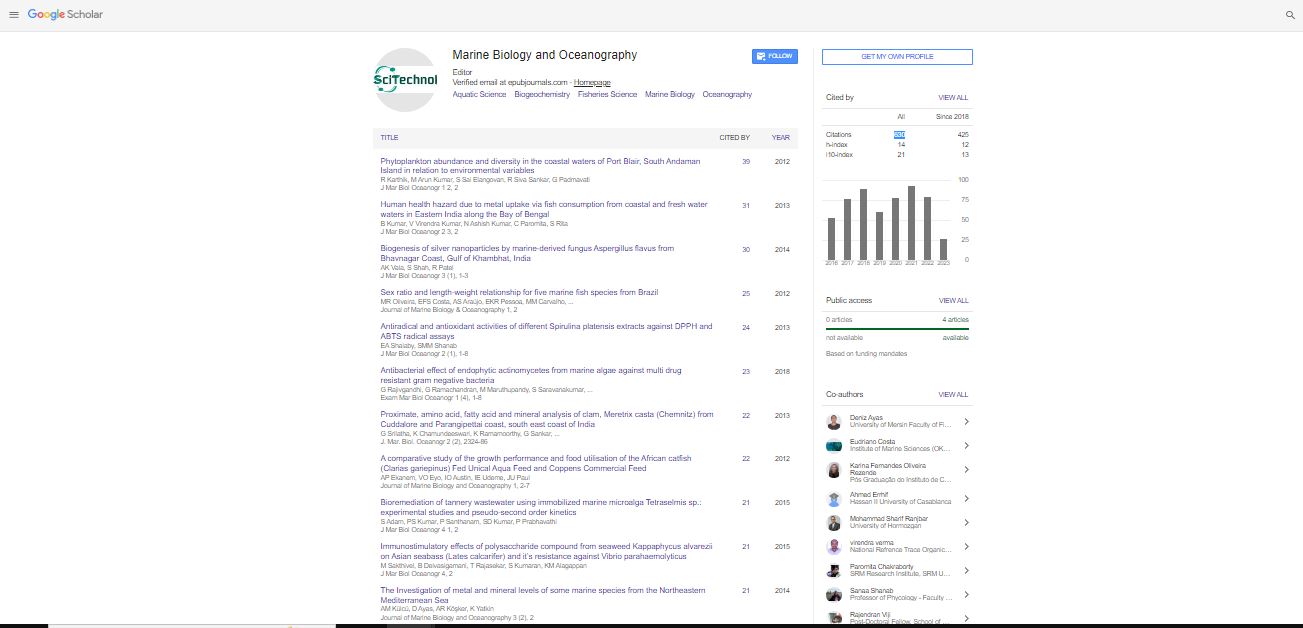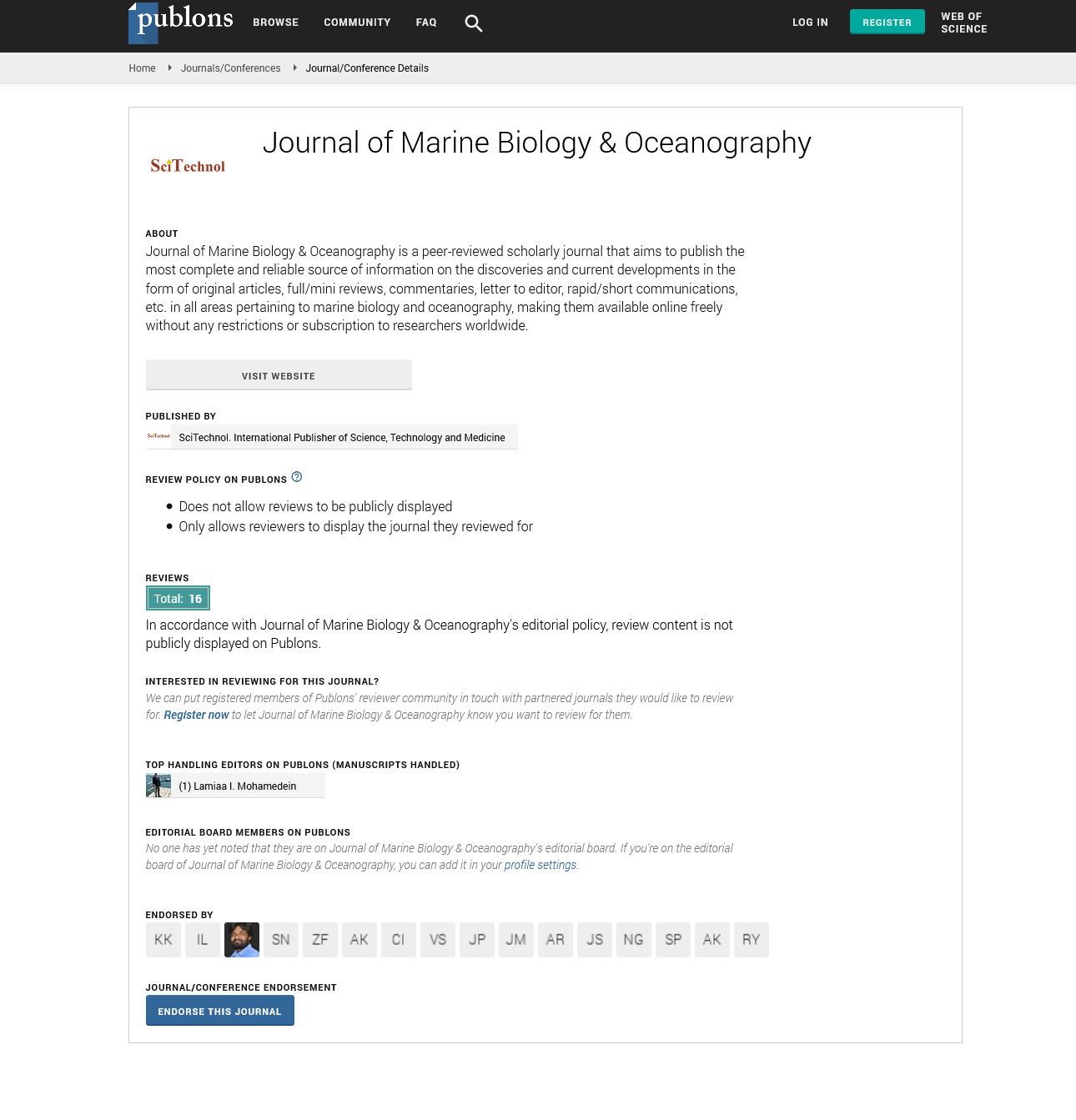Perspective, J Mar Biol Oceanogr Vol: 12 Issue: 5
Analyzing the Role of Marine Chemistry and its Significance on Ocean Health
Tang Fengh*
1Department of Marine Chemistry, Guangxi University, Nanning, China
*Corresponding Author: Tang Fengh,
Department of Marine Chemistry, Guangxi
University, Nanning, China
E-mail: tang_fanggu32.cn
Received date: 20 September, 2023, Manuscript No. JMBO-23-121770;
Editor assigned date: 22 September, 2023, PreQC No. JMBO-23-121770 (PQ);
Reviewed date: 06 October, 2023, QC No. JMBO-23-121770;
Revised date: 13 October, 2023, Manuscript No. JMBO-23-121770 (R);
Published date: 20 October, 2023, DOI: 10.4172/2324-8661.1000289
Citation: Fengh T (2023) Analyzing the Role of Marine Chemistry and its Significance on Ocean Health. J Mar Biol Oceanogr 12:5.
Description
The health of the oceans is essential for the well-being of the entire planet. Marine chemistry, the study of chemical processes in the marine environment, plays an essential role in understanding and preserving the delicate balance of the oceans. One of the key factors monitored by marine chemists is the pH level of seawater. The ocean acts as a natural carbon sink, absorbing large amounts of carbon dioxide from the atmosphere. However, increased carbon emissions have led to a rise in the levels of carbon dioxide in the ocean, resulting in a phenomenon known as ocean acidification. This process lowers the pH of seawater, posing a threat to marine organisms, particularly those with calcium carbonate shells or skeletons, such as corals and mollusks. Understanding and monitoring these pH changes are vital for predicting and reducing the impacts of ocean acidification.
Marine chemistry also plays an essential role in studying nutrient cycling in the oceans. Nutrients like nitrogen and phosphorus are essential for the growth of marine plants and algae. However, human activities, such as agricultural runoff and industrial discharges, can lead to an excess of these nutrients in coastal areas, causing eutrophication. This process results in harmful algal blooms, oxygen depletion, and the creation of "dead zones" where marine life struggles to survive. By analyzing nutrient levels and understanding the dynamics of nutrient cycling, marine chemists contribute to strategies for mitigating eutrophication and preserving coastal ecosystems.
Trace elements, including metals like iron and copper, are vital for the health of marine organisms. Marine chemistry investigates the sources, distribution, and biological impacts of these elements. Iron, for example, is a key nutrient for phytoplankton, the foundation of marine food webs. Understanding the intricate relationships between trace elements and marine life helps experts assess the potential effects of human activities, such as mining and industrial discharges, on the health of marine ecosystems.
The oceans face numerous challenges from human-induced pollutants. Marine chemistry is instrumental in identifying and analyzing various contaminants, including oil spills, heavy metals, and synthetic chemicals. The impact of these pollutants on marine life, as well as their persistence in the environment, is a vital focus of studies. By understanding the behavior of pollutants in the marine environment, analysts can develop strategies for pollution prevention, clean up, and the protection of marine biodiversity.
Marine chemistry is closely linked to the broader field of climate science. Rising global temperatures due to climate change have profound effects on ocean chemistry and marine life. Warmer temperatures influence the solubility of gases, nutrient cycling, and the distribution of marine species. Additionally, the melting of polar ice caps contributes to sea level rise, further altering ocean dynamics. Through the analysis of temperature variations and their impact on marine chemistry, analysts can better predict the consequences of climate change on ocean health.
The complex nature of marine chemistry issues necessitates global collaboration. Experts, policymakers, and conservationists around the world work together to share data, develop strategies, and implement conservation measures. Marine chemistry serves as an essential component for these collaborative efforts by providing the theoretical basis for informed decision-making.
 Spanish
Spanish  Chinese
Chinese  Russian
Russian  German
German  French
French  Japanese
Japanese  Portuguese
Portuguese  Hindi
Hindi 
